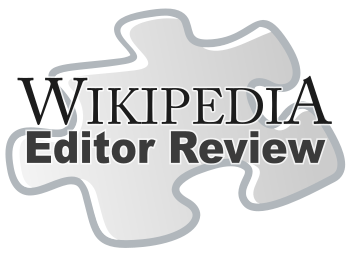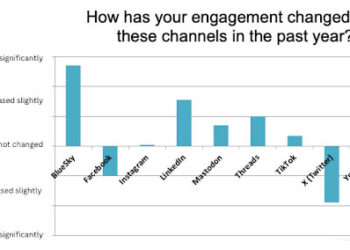
Recently, I wrote a post outlining some concerns that have emerged around the claims surrounding Jack Andraka, whose story is often cited by open access (OA) and lay science advocates to show that OA can benefit lay people and drive important scientific discoveries.
The purpose of that post was not to attack a promising young person, but to penetrate the fog of mythology that has sprung up around his purported accomplishments. His story has been exploited by the media and others to advance pre-determined agendas. One new example includes a recent attempt at fundraising by Creative Commons.
The post touched a raw nerve among some. This time, instead of being called nasty names or threatened with lawsuits because we offended someone’s finer sensibilities, the Scholarly Kitchen and the Society for Scholarly Publishing were attacked in a manner befitting the Internet Age — via Wikipedia.
Harassed on Wikipedia by a Disgruntled Commentator
One part of my Andraka post discussed some of the edits to Andraka’s page on Wikipedia, which were self-referencing and showed a history of excising critical citations and text. Toward the end of the day on Tuesday, January 7, I was receiving a stream of prosecutorial comments from a user identified as “ech,” who took exception to the phrasing in the statements about these edits. Fair enough — language can often be imprecise, and the written word can be interpreted by different readers in different ways. I did my best to explain the intent behind what I had written, realized we had an intractable difference of opinion, and went to bed.
The next morning, two pages on Wikipedia had been deleted — the page for the Scholarly Kitchen, and the page for the Society for Scholarly Publishing (SSP).
The commentator known as “ech” turned out to be Erik Haugen, a Google employee and a long-time Wikipedia editor. Following our exchange, Haugen apparently deleted the Wikipedia pages for the Scholarly Kitchen and the SSP.
There was a lot of discussion and a wearying amount of back and forth over the course of the day.
Some argued that Haugen was technically correct in what he was doing, even if his motivation and goals were both questionable. In a particularly bizarre exchange on another blog, Haugen admitted deleting the pages would be “a ridiculous and inappropriate response to the article.”
Ultimately, the Scholarly Kitchen page was reinstated in a heavily edited form, while the SSP page was restored in a skeletal form. Notably, the editing on both pages introduced typos, incorrect information, and incomplete information.
Haugen apologized in that sort of obtuse style that leaves some room for doubt, in an exchange on Wikipedia about how he handled the deletions:
I really regret how long these were blanked/deleted for. That, among other things I did here, has really contributed to a feeling of hostility. I should have realized my actions came across that way and done things differently; I’m sorry about that.
All this seemed to be just a tempest in a teapot. But it gave me pause about two things — bullying and the editorial controls of Wikipedia.
This was a novel form of bullying — putting someone’s Wikipedia pages under the microscope just because you don’t like what they’ve said somewhere else. Haugen’s motivations are unclear, but it’s difficult to see this as anything other than a petty attempt at revenge.
Which brings us to the editorial controls of Wikipedia itself, which are almost completely impenetrable to anyone outside the small number of obsessive-compulsives who perform nearly all the edits on the site. What started as an attempt to create a completely open resource with no management structure has evolved into a “crushing bureaucracy with an often abrasive atmosphere that deters newcomers.” Consequently, Wikipedia is losing editors, and experts are regularly vowing never to bother wasting their time contributing to a site that seems more interested in enforcing arcane rules than in collecting knowledge. I’ll add myself to that list.
It’s sad, because I’ve been very hopeful for years about Wikipedia’s potential, and a regular donor until last year, when my attempts to add factual information to the Scholarly Kitchen entry led to my banishment for these self-same arcane and rigid reasons. Rather than seeking a constructive solution, the editors I encountered in that instance were more interested in asserting themselves and Wikipedia rules than in adding to the knowledge base in the resource.
At the end of the day, when evaluating the potential harm to SSP and the Scholarly Kitchen from this, we discovered that Wikipedia provides so little traffic and exposure that its effect is immaterial. There’s no reason to give a Wikipedia editor, who seems accountable to nobody in particular, leverage over anything we do. While getting an entry on Wikipedia was at one time desirable because the theory was all about social media, search engine optimization, traffic, and legitimacy, my take-away is that any gains in these areas are probably meager, while the risk of having your presence on Wikipedia leveraged against you by untrained, unreliable, and unconstrained Wikipedia editors is high.
Even Andraka Feels His Story Has Taken On a Life of Its Own
Another complaint about my blog post was that I shouldn’t have questioned, and thereby diminished, Andraka’s claimed accomplishments. Well, it turns out that many, including Andraka himself, now see that his initial claims were too grand and have been blown out of proportion.
In an excellent article published January 8, 2014, in Forbes, Matthew Herper, who runs the Forbes “30 Under 30” list of interesting young innovators to watch, gave Andraka’s claims a bit more scientific scrutiny:
I decided not to include Andraka on the list, overriding the recommendation of an expert judging panel, because the work was not yet published in a peer-reviewed scientific journal. It is by published work that scientists are judged. I still think this was the right decision. In fact, when Andraka volunteered to share a draft of a paper that he does plan to submit to a scientific journal, my concerns deepened.
After sending a draft of Andraka’s as-yet-unpublished paper to five scientists in related fields, Herper’s conclusion is this:
The consensus: Andraka’s sensor is a probably a publishable piece of science that could eventually appear in a journal, and was a remarkable achievement for a high school student. But it falls far short of changing science and is only a small step toward developing a workable cancer diagnostic.
Andraka himself has learned that his claims are much more modest than the media and others have led us to believe:
“While promising, the project really was extremely preliminary and is by no means as sophisticated as some stories say it is,” Andraka writes me [Herper] via email. “I realize that in retrospect that it was just a high school science fair project and it was a proof of concept experiment and initially I thought that it could get on the market in 1-2 years however I’ve learned so much over the course of this journey and realized that it will in reality take a lot longer than this.”
Andraka is clearly a gracious and talented young man swept up in events he couldn’t have anticipated. I like Herper’s conclusion, which is really why there is such a problem in exaggerating Andraka’s accomplishments in order to exploit them for self-serving purposes or attacking anyone who questions them and the limitations that have been emerging:
In one of the first stories about Andraka, Forbes Managing Editor Bruce Upbin asked: “Wait, Did This 15-Year-Old From Maryland Just Change Cancer Treatment?” Nineteen months later, I feel safe answering: No, he didn’t. And I think it’s unfair to him, and to the work he did do, that we expected him to. Because what he did — creating a cool biosensor while still in high school — was pretty neat on its own.
So, let’s stop exaggerating, exploiting, twisting, and misrepresenting this young man’s work to suit a particular goal or narrative. If a cause is worth supporting, let it be judged on its merits, rather than trying to smuggle virtues in through myths based on unexamined claims.
(Hat tip to BH for the Forbes link.)
Discussion
24 Thoughts on "The Andraka Saga Continues — Vengeance via Wikipedia, and a More Complete View of the Claims"
One facet to this cautionary tale is the impact on cancer patients of these types of stories. Hopes rise and fall quickly for cures and therapies and greater responsibility is placed in my opinion on those who choose to write about them. Perhaps some judicial forethought should be given to preparing headlines that will only be retracted.
I think this is true. It’s also a disservice to the wonderful advances already made and being made in normal research tracks. For instance, the current screening methods for pancreatic cancer are very effective. This story obscured that fact, and made it seem like we were in great need of something that already exists.
Can you give us an example of an arcane rule?
Wow! This is certainly complex, far worse than a manual of style. Here is a specific example related to complex issues: http://en.wikipedia.org/wiki/Wikipedia:Neutral_point_of_view. They even coined the acronym NPOV. Wikipedia has spawned it’s own language, as all technical communities must do. Perhaps a certification program lies ahead.
Kent, in regulatory terms what you describe is called selective enforcement. This is when rules that are typically only loosely applied are strictly applied in order to punish someone. I have seen it before, for example in highway construction. Very sad to see it in Wikipedia, which I have admired greatly.
These are horrifying, but one mitigating factor here is that you don’t need to know any of these rules to edit; I think as a practical matter they’re *mostly* used to give guidance when disputes come up. For example, if someone felt strongly that the article about this blog should be called “The Scholarly Kitchen” instead of “Scholarly Kitchen”, they could propose a rename and discussion might ensue about how the guidance and community consensus reflected at https://en.wikipedia.org/wiki/Wikipedia:Article_titles are or aren’t relevant to this particular case.
Sometimes these rules interact in unintended and unfortunate ways, I think, as in the other case that Kent mentions in this article.
I’ve had numerous struggles re. editorial policy and Wikipedia and had multiple issues with one particular WP editor who took offence to my Pornstars vs Scientists posting (http://www.chemconnector.com/2011/11/17/why-are-pornstars-more-notable-than-scientists-on-wikipedia/) and went off to mess with other edits I’d made. There was general support from many other WP influential people regarding what I was trying to say but when an anonymous editor takes a liking to you it becomes very interesting
I was particularly impressed by how quickly several people who often disagree with the viewpoints expressed in the Scholarly Kitchen (including the post that seemed to trigger all of this) came to its defense, as shown in several of the links above. It was a classy thing to do, and full credit to Mike Taylor and others.
It’s interesting, and perhaps telling of human nature, that projects like Wikipedia whose original purpose was to replace “stuffy,” “nontransparent,” and “expensive” forms of knowledge dissemination become, well, stuffy, nontransparent, and expensive (in terms of costs associated with acting on potentially faulty or incomplete information).
I for one have returned to using information that has been selected and vetted by those who are paid to do this job because they’re qualified for it. This of course doesn’t guarantee 100% accuracy, but I can no longer afford to trust “crowd-sourced” content created mainly by people whom I don’t really know and who for one reason or other seem to have a lot of free time on their hands.
“Haugen apologized in that sort of obtuse style that leaves some room for doubt”—Beg pardon for that; I didn’t mean to leave any doubt about anything. As you say here, “it’s difficult to see this as anything other than a petty attempt at revenge”, and I *should* have realized that my actions would look like that and done things differently to avoid the arbitrary-seeming “your article was deleted” feeling that resulted. There were other ways to get the articles improved without making it seem hostile and look and feel like a vendetta; I should have pursued those instead and for that I apologize.
Of course, your previous article or my disagreement with you there had nothing to do with my deleting the articles, other than the fact that your article and the one about it prompted me to read the Wikipedia entries. Deleting or editing for that reason would be unthinkable. I have respect and admiration for this blog as well as the SSP, and want to see the articles on Wikipedia about them be the high quality articles that the subjects deserve. But, again, I realize how my actions came across.
The Semantic Rain article that you link to goes into detail about the reasons for deleting and rewriting. I’ve also commented there about the previous “banishment” episode you mentioned. I do these kinds of deletions quite regularly, so I often look for those issues and didn’t think twice about deleting when I saw them.
You make an important point about bullying, or the more general problem of attacking someone via Wikipedia, whether or not it’s bullying. It’s huge and one that the Wikipedia community is acutely aware of.
Thanks Erik, I appreciate your willingness to come forward and shed some light on what happened. No hard feelings on my end, and it was a valuable exercise, a chance to spend some time thinking about Wikipedia. I’ve long had some issues with what it’s become, and feel like there’s an enormous amount of unfulfilled potential there, mostly due to an over-emphasis on rule enforcement to the detriment of the actual content and knowledge shared. Knowing the rules seems more important to participation than expertise in a subject, and that’s a shame.
In the past, I’ve used Wikipedia to help bring attention to new publications that were seeking recognition, adding supporting links to articles where relevant. This probably did some good in terms of SEO and a small amount of traffic. But for an established publication or group, as Kent notes, the allure of Wikipedia seems to have worn off. There used to be a strong desire to be included in Wikipedia, but reflection upon this incident has changed my opinion. If you’re established enough that you don’t need the SEO help or the traffic, then inclusion in Wikipedia is more of a burden than a boon.
If people want to learn about the Scholarly Kitchen or the SSP, I’d rather they went directly to our sites and looked at the information there, rather than a distillation/interpretation of that information through third parties. At this point, a Wikipedia entry is just another online presence that one must monitor, but over which one has no control whatsoever (and unlike blog comments and the like, one is not allowed to respond with corrections because you’re forbidden from editing your own entry).
Really, including us is more important to Wikipedia than it is to us. Given a choice, I’d rather the entries stayed deleted. There’s a small, warm, fuzzy feeling from knowing someone thinks you’re as important as an obscure demon who appeared in the background of an episode of Buffy the Vampire Slayer for 30 seconds, but beyond that, there’s not much upside.
All of this makes sense as far as it goes, David, but it seems to be written from the assumption that inclusion in Wikipedia is for the benefit of the included entites; it’s not, of course, it’s for the benefit of readers. So when you write “If people want to learn about the Scholarly Kitchen or the SSP, I’d rather they went directly to our sites”, I don’t doubt it. But as a reader, I’ve found that close to 100% of the time, the Wikipedia article on an organisation lets me get the information I want much more quickly than the organisation’s own web-site.
In short, the SSP web-site tells visitors what the SSP wants them to know; but a good Wikipedia entry tells them what they want to know. Which of course is why it’s such a shame that this happened.
As noted, this is more about Wikipedia’s benefit than ours, which, at least for me, is a turnaround in attitude. I was originally really pleased to see us listed, but with this further level of reflection, not so much.
I do understand the value of distillation and (alleged) objectivity promised by Wikipedia, but the actual real-world performance remains lacking. As happened here, in order to conform to the rules, the entries are now much less informative. Rather than telling the reader what they want to know, now they don’t say much at all. Rules win out over information, persistence wins out over accuracy. The need to rely on second-hand sources rather than original material is a bit like a scientist only reading review articles, rather than the primary literature.
One of my favorite authors, Neil Gaiman, has written quite a bit about his frustrations with the Wikipedia entries on his work, and serves as a good example:
http://journal.neilgaiman.com/2009/01/journeys-end.html
I decided not to look at my Wikipedia entry, because that way is madness, and given that, as the person involved I’m not actually allowed to change things, much as I would perhaps like to, I decided that it is best left unlooked-at. But every now and then a google search for something else gives me the first sentence of my Wikipedia entry and I read that my family came to England from the Netherlands in 1916, and it irritates. I really doubt that there was much cross-channel emigration in the middle of World War 1 for a start. (My paternal great-grandfather came to the UK before 1914; and he would have come from Antwerp, which isn’t in the Netherlands now, and wasn’t then. And I wonder why the paternal line is so privileged…)
And the strange thing is, that if I grumble about it here, then that gives someone editing the Wikipedia entry something to link to, and thus it will be fixed. Until someone finds a link to something that got it from Wikipedia in the first place, and changes it back.
More from Gaiman on the vagaries of Wikipedia:
http://journal.neilgaiman.com/2007/12/blinking-at-daylight.html
http://journal.neilgaiman.com/2010/05/one-book-one-twitter-one-wondering.html
http://journal.neilgaiman.com/2006/05/what-bears-do-on-lawn.html
I don’t think anyone would deny that in this case, the result of over-rigid hair-trigger application of the rules has been a net loss in the value of the SSP and TSK Wikipedia entries. But let’s not generalise from a sample of one (or two). In the great majority of cases, Wikipedia’s entry on (say) Brunel University or Java Server Faces or the NSA will give you the information you want ten times faster than the official web-site of any of those things. Hopefully the same will soon be true of the SSP and TSK entries, too.
As for Gaiman — I find his Sandman comics compelling, his Doctor Who script “The Doctor’s Wife” superb, his novels only so-so (I’ve read American Gods and Neverwhere) and his whining about Wikipedia tedious. If there is a flatly incorrect statement in his Wikipedia entry, he should fix it, end of. It would take him a tenth as long as whining, and have an actual outcome.
I think the problem is the variability. You don’t know if what you’re reading is an accurate set of the information you need, which makes it a much less reliable resource. If Gaiman fixed the entry about himself, he would be in violation of Wikipedia’s rules, and much like Kent Anderson, be banned from the site and have his changes reverted.
“If Gaiman fixed the entry about himself, he would be in violation of Wikipedia’s rules, and much like Kent Anderson, be banned from the site and have his changes reverted.”
I don’t think so. The rules on this page strongly discouraging autobiographical entries say:
If Wikipedia has an article about you, we want it to be accurate, fair, balanced and neutral – to accurately reflect the sourced, cited opinions of reliable sources. […] You may wish to make suggestions on the article’s talk page or, if the problem is clear-cut and uncontroversial, you may wish to edit the page yourself. If your edit may be misinterpreted, you should explain it on the talk page.
There’s a big difference between using Wikipedia as a platform for self-publicity and fixing errors of fact. IIRC, the Wikipedia editors felt that Kent had crossed the line from the latter into the former.
Read Stardust. It’s excellent.
So, the fact that SSP and the Scholarly Kitchen came to your attention through this exchange is how you noticed that the pages violated the rules.
The interesting thing is that the only people who know enough to post objective and complete information are those involved in the organization. I happen to know from my long involvement with the leadership of SSP that the entries were created by SSP volunteers. Yes, these were technically copyright violations, but actually the creators of the original pages had the permission (and actually the request) of the Society to reproduce those descriptions. A simple attribution would have solved the problem. I don’t believe you took them down because you disagreed that any statements were factual, did you? Certainly if editors found the descriptions to be one-sided, they could subsequently edit them to be more neutral, if anybody cared enough to do so. But that hadn’t happened.
This is a critical tension in wikipedia. What is the incentive to contribute to any particular entry? You want the world to know who you are (but you’re not supposed to speak for yourself), or you have an axe to grind and you want to tear something down (you’re not supposed to create an attack page). Or you see a mistake and you want to fix it. Nobody else cares enough to put in the work.
Like many other organizations, SSP is a relatively obscure (except for those in the area) volunteer led society. Usually, it flies under the radar. If you relied on non-SSP volunteers to edit the page, you’d probably get a lot of false information about how it is a lobbying organization for commercial publishers, which seems to be the consensus on social media, and which could not be further from the truth.
Because Kent is outspoken and well spoken and has a very particular point of view, researchers, particularly those who disagree with him, have lobbed all kinds of untrue accusations, not only at Kent, who is in fact quite a nice person, but at the Kitchen, and the SSP itself. This is the price of allowing all viewpoints.
I have edited other wikipedia pages (which I will not identify for fear they will be deleted for rules violations–thought I suppose you could go on a hunt for them) because I’m in a position to know. I only change matters of fact. Nobody else cares enough to provide information on these pages because of the relative obscurity I mentioned before.
What we have, then is a system of selective enforcement. The fact is that many wikipedia pages are created or edited by marketing types who have a vested interest in the content of the pages. Only when these pages are brought to an editor’s attention, are the rules activated.
Seems dangerous to me.
And for the record, I still think this is the best explanation of Wikipedia ever written:
http://www.theonion.com/articles/wikipedia-celebrates-750-years-of-american-indepen,2007/



